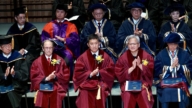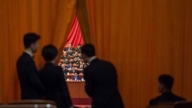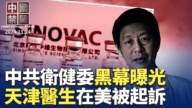【新唐人2014年07月17日訊】中共當局對中國新聞記者下發一系列禁令之後,日前,廣電總局再對商業網站的所有境外影視劇下發禁令,要求必須在一週內下線,同時中宣部也被曝出,要求境外社交網路服務軟件必須馬上下架。評論斥責中共愚蠢到在互聯網時代要「閉關鎖國」。
中共新聞出版廣電總局,日前分別約見包括《央視》、《央廣》等七家互聯網電視牌照商,要求他們必須在一週內,下線所有從境外引進的影視劇、微電影等,等待總局核查。
據報導,總局最晚將在7月21號開始檢查,整改不到位的由總局出面處理,哪家不按總局要求做,就收回牌照,如果七家都違規,就暫停互聯網電視業務。
原《河北人民廣播電臺》編輯朱欣欣認為,這都是中共專制統治合法性出現危機的表現,它怕境外劇佔領中國市場,那些宣傳洗腦作品則失去市場。
原《河北人民廣播電臺》編輯朱欣欣:「因為國外的,別看這些娛樂性的或者微電影啊一些作品,其實裡面背後都有一些先進的理念,自由、民主的理念在做支撐,中共害怕人們從這裡面不知不覺會受到熏陶,受到感染。」
朱欣欣表示,中共就是把境外劇全部封殺,它的節目仍然不會有人看,而這種愚蠢的作法,只能讓人們見證它的落後和專制。
原《陝西電視臺》記者馬曉明:「中共現在已經倒退到了毛澤東時代了,封閉民主社會和自由社會的文化,要讓它們所謂的專制,一黨獨裁、一黨專制的這種文化,牢牢的統治所有的文化和新聞出版領域,對人民實行這種愚民政策,進行所謂愛它們這個黨,愛國的這種所謂的教育。」
7月上旬,中共封鎖了幾個境外社交應用軟件(Line、Flickr、KakaoTalk、OneDrive),7月10號,「臉書」(Facebook)旗下的圖片分享軟件「Instagram」也從大陸「安卓」應用商店消失。
有網友曝光中宣部下發的禁令﹕要求境外社交網路服務軟件必須馬上下架。網友紛紛斥責:中共當局愚蠢到妄圖在互聯網時代「閉關鎖國」。
江蘇南京資料庫工程師章浩奇:「這也是情理之中,它在屏蔽之中這樣的事會越來越多,因為從互聯網下手是它們的第一要務,技術上它們能做,但是,我相信應該搞不定的,總會有替代的方式可以用。」
而朱欣欣表示,互聯網時代,中共再多禁令,也無法阻止中國民眾利用翻牆軟件,到海外網站獲取更多的資訊。
中共在不斷加強網路監控的同時,對新聞記者也發出一系列禁令。如,6月,廣電總局發文,禁止記者「私自展開批評報導」;7月8號,再發文禁止記者記錄、傳遞所謂的「國家機密」,以及給境外媒體撰稿。
7月15號開始,約有25萬名中國記者,被中共要求與所在新聞單位簽署所謂「保密承諾書」,和「職務行為信息保密協議」。
馬曉明表示,新聞記者從正式渠道採訪到的消息,不存在保密不保密的問題。
馬曉明:「中共它現在所說的保密,實際就是說的,它所封鎖的大量的消息。這對公民的知情權,對記者的採訪權是一個非常嚴重的侵犯,是對中共所要封閉和隱瞞、封鎖的消息所採取的一種措施。」
馬曉明指出,中共近期採取的一系列措施,就是要完善它對中國民眾的思想封鎖、新聞封鎖和文化封鎖。
採訪編輯/李韻 後製/葛雷
China Bans Foreign Dramas and Software
The Chinese Communist Party (CCP) has issued
more restrictions to the Chinese media.
All foreign dramas on commercial websites
are being ordered to go offline within a week.
The Central Propaganda Department is also reported
to have shelved software from foreign social networks.
The series of acts have caused public to condemn the CCP’s
policy of isolating China in today’s information age.
The CCP’s top media regulator has demanded 7 Internet TV
license providers such as China Central TV
and China National Radio to withdraw all foreign dramas,
short films, and so on, for the administration’s investigation.
It’s reported that any violation after July 21 at the latest
will be subject to punishment of a revoked license.
If all 7 providers failed to meet the requirement,
Internet TV services will be halted.
Former Hebei People’s Radio editor Zhu Xinxin
says this represents the crisis of the CCP.
Its failure to maintain its regime’s legitimacy makes it worry
that foreign films may occupy the Chinese market
and the CCP’s brainwashing media may lose the market.
Zhu Xinxin: “Those foreign entertainment things or short
movies contain progressive ideas, like freedom and liberty.
The CCP fears these things might seep into and influence
people’s minds."
Zhu Xinxin says that even if the CCP banned all foreign
dramas, people still wouldn’t want to watch its programs.
Zhu says these foolish actions will only have people witness
the CCP’s backwardness and tyranny.
Ma Xiaoming, former Shaanxi TV reporter: “The CCP has
stepped back to the Mao era, when the culture
from democratic societies and free societies was blocked.
The culture of the one-party rule or one-party dictatorship
is firmly governing all cultural and news publishing.
It’s done to enforce ignorance in the people, and indoctrinate
them with flag-waving so-called love for the party."
In early July, the CCP blocked several foreign social media
software, such as Line, Flickr, KakaoTalk, and OneDrive.
On July 10, Facebook’s photo sharing software, Instagram,
also vanished from Android software stores in China.
Netizens exposed the ban issued by the Central Propaganda
Department: All foreign social networking services software
must immediately be removed.
Netizens rebuked, “CCP authorities are trying to close off
the country in the information age."
Zhang Haoqi, database engineer in Nanjing city, Jiangsu:
“It makes sense. Things like this will happen more.
To block information, the Internet is their priority.
Technically, they can do it. But, I don’t think it will work.
People will always have alternatives."
Zhu Xinxin says that in the information age, the CCP’s many
new bans can’t stop people from using software to overcome
internet censorship and get information from overseas websites.
While the CCP continues to strengthen its monitoring
of the Internet, a series of restrictions placed on journalists
has also been seen.
For example, in June, reporters were ordered not to conduct
critiques and commentary without approval;
On July 8, reporters were again forbidden to record or pass on
『state secrets』 or serve as correspondents for foreign media.
Beginning on July 15, about 250,000 Chinese reporters were
demanded to sign the confidentiality agreement form
and the task and behavior confidentiality form.
Ma Xiaoming says that the issue of confidentiality should not
exist for information obtained through official channels.
Ma Xiaoming: “The so-called confidentiality is frankly
about all information the CCP covers up.
It’s a serious violation of the people’s right to know the truth
and the reporter’s right to interview.
It’s a measure of the CCP to hide and block information."
Ma Xiaoming says that the CCP manipulates these measures
to ensure its blockade of ideology, news, and culture.
Interview & Edit/LiYun Post-Production/GeLei




























